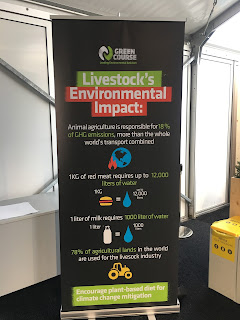At Cop 21 in Paris, France, the most inclusive and wide-reaching agreement ever for climate was signed. The Paris agreement changed the focus for countries from "you have to give" to "what will you give?". The Kyoto protocol told countries that they had to do a certain amount to mitigate climate change and we all saw how that eventually turn out. The Paris agreement aimed to fix this problem by setting a goal, 2° Celsius; preferably 1.5° Celsius. The Paris agreement asked what countries would do, added up all the pledges and, using extrapolation, estimated what the temperature in 2100 would be. For the Paris agreement to work, each country was asked to submit their nationally determined contributions or the NDC’s.
 |
| Patricia Espinoza, UNFCCC. Princess Lalla Salama of Morocco |
Once the NDC's were submitted and all of the countries began work on their own NDC's, many countries realized that they didn't know how to meet their goals. They had made these ambitious commitments to meet the need to address climate change, but small and developing countries began to struggle to meet their NDC’s. At COP 22 in Marrakech Morocco, the countries came back together and created a partnership. The NDC Partnership was formed to better aid small and developing countries meet their NDC goals. With the advent of the Partnership, small countries were able to build an important and crucial dialogue to evolve their views on climate change, and the actions needed to meet their NDC’s.
 |
| NDC Partnership Members. |
Cut to one year later at COP 23. Now that the NDC partnership has formed, over fifty different countries have joined in to exchange the vast wealth of knowledge that they all share. I was fortunate enough to be invited to a high-level event where several of the world's prime ministers, presidents, and country leaders came together to have a discussion on how the Partnership has helped them and why other countries should join. The Fijian prime minister began with the opening speech. He told the group that the environmental strides and improvement in policy would not have been possible without the Partnership. The sheer amount of the knowledge that his government has gained is unparalleled by any other source. He stated that, “No one country can do any of this on their own. We all must be in this together to save our planet." Then a slew of other environmental ministers, energy ministers, and prime ministers spoke for one minute each about how the Partnership has benefited them. From this, the announcement was made of regional hubs, including but not limited to the Africa Hub, and the Pacific Islands Hub. Closing remarks were given by Patricia Espinoza, the Executive Secretary of the United Nations Framework Convention on Climate Change (UNFCCC). She once again stated that we cannot do this alone. We Are All In This Together. We Cannot Do This Alone.
Griffin P.




Comments
Post a Comment
Thanks for the comment. We'll get it posted ASAP. Remember that we are in time zone UTC +1, seven hours ahead of Minnesota.